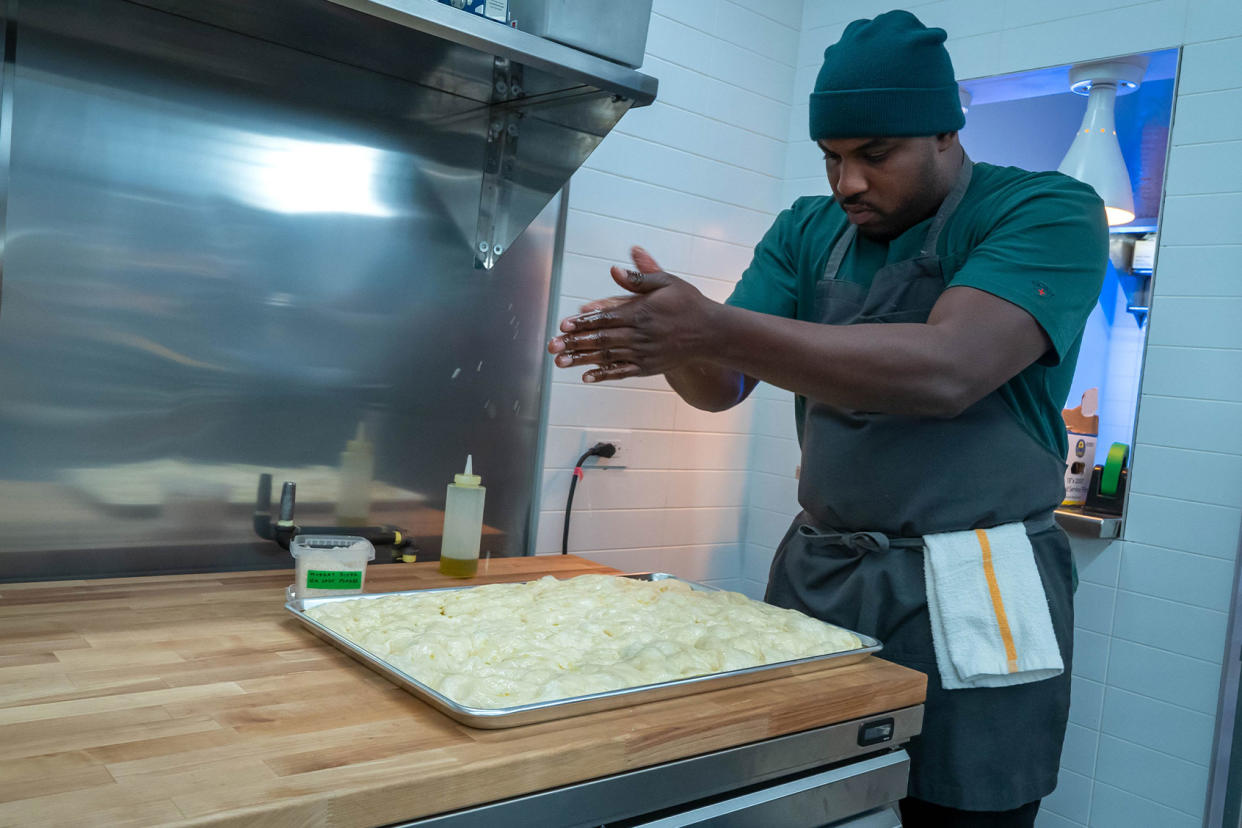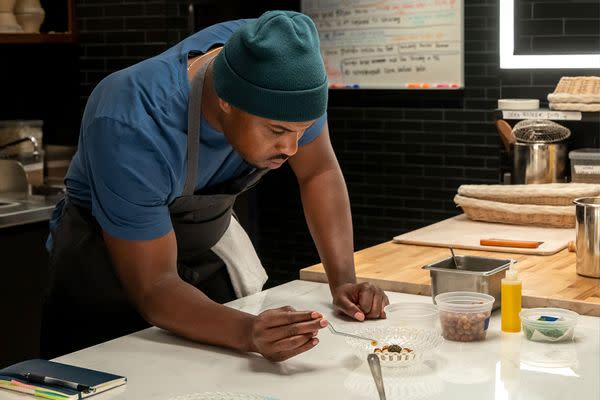A "woke" flour fit and "The Bear" explain why we need to see more bakers of color in the world

There are noble food boycotts, like refusing to buy an item in solidarity with agricultural workers fighting for better working conditions or to stop the inhumane treatment of livestock. Then there are desperately stupid ones, like the right wing’s collective conniption over Bud Light sending transgender influencer Dylan Mulvaney a single can of oat soda with her face on it. Thousands of belching conservatives angrily announced on social media and elsewhere that they’d never drink Bud Light again. Then, what do you know, one of the movement's leaders started serving it at his bar again.
The latest food freakout concerns King Arthur Baking Company’s Baking Pitchfest 2024, described as “half mentorship, half competition,” for entrepreneurs of color who either own bakeries or a brand of baked goods. Since this fits right into the right’s war on diversity, equity and inclusion efforts in schools and corporations, MAGA cultists made it known on Elon Musk’s X and an array of right-wing websites that the 234-year-old flour company had betrayed them.
For more than a century King Arthur’s logo featured a medieval knight bearing a standard featuring a red cross on a white background, a favored graphic among white supremacists. If a segment of the population operated under the belief that this was their flour, they must have been shocked when, amid the 2020 civil rights uprisings, the company abandoned that guy in favor of a crown while doubling down on its DEI efforts. (For the record, King Arthur said its rebrand was “the product of a rigorous 18-month brand research and creative strategy process” that began in 2019.)
Or maybe they weren't. Those folks tend to have hobbies other than making layer cakes.
Unlike other corporations that posted #BLM hashtags on their accounts and called it good, King Arthur continued “fostering an environment of diversity, equity, and inclusion,” it says on its website, which also boasts that the employee-owned company is a certified B Corporation. That designates it as a leader in "the global movement for an inclusive, equitable, and regenerative economy," according to B Lab. I’m spelling out these details as proof that wingnuts are way late here; King Arthur yielded a bounty of reasons for racists to lose their minds en masse years ago.
You know that old saying about drinking poison and waiting for the other person to die? This is pretty much that, only instead of chugging arsenic, these saps are abandoning their go-to pleasures to punish people who offend them, who they’ve never met and never will, and who definitely aren’t thinking about them.
This idiotic hysteria is over a baking contest, remember. One that sounds like “Shark Tank” meets “The Great British Baking Show,” except expressly for marginalized folks. This outsized reaction to a small-batch competition underscores the artificiality of this new right-wing rage boycott. It also foretells how ineffective it will be. Fewer people regularly use flour than knock back cold ones. Those who do may be loyal to a brand for a specific purpose and demonstrated track record.
Some good will come out of this nonsense anyway, in the form of a baked product line and a bakery owned by people of color winning financial support and promotion through King Arthur, the fourth most popular flour behind Pillsbury, store brands and Gold Medal, according to Statista.
For my part, this noise inspired a reconsideration of, and fresh appreciation for, the “Honeydew” entry in Season 2 of “The Bear.” I might have rewatched it anyway, what with the FX show being fresh off its slew of Emmys and Golden Globe wins, including for best comedy.
The featured performer of “Honeydew,” Lionel Boyce, was not among the acting category nominees; his castmates Ayo Edebiri, Jeremy Allen White and Ebon Moss-Bachrach won individual awards, but in Emmys’ case, it was for their work in Season 1.
Boyce’s Marcus is a pivotal character in Season 2 due to his quiet dedication, natural affinity for baking, and self-starting passion to be great, not simply good. He's also one of the few Black professional bakers we seen on TV who isn't on Food Network.
In Season 2 White’s character Carmy Berzatto launches his quest to transform his brother’s run-down sandwich joint into a bistro worthy of a Michelin star and recognizes Marcus’ drive. He funds the baker's trip to Copenhagen, Denmark, home of the world-renowned three-starred Noma. There, he stages (i.e. interns) for a short time with a pastry chef named Luca (Will Poulter), one of many unsung masters Carmy knows. Luca is exacting but gentle, raising Marcus’ game in the short time they have together.
"Honeydew" is a quiet beauty relative to most episodes of "The Bear," so you may not mind watching a few times to fully digest what its writer Stacy Osei-Kuffour is saying about how the fine dining world might treat someone like Marcus versus Luca.
Luca explains he never went to school to be a pastry chef. He ditched out on a check at a restaurant, got caught, was made to bust suds as penance, and ended up loving the kitchen. Marcus, meanwhile, played football to pay for his college education, then couldn’t get a job when he got out.
So he stumbled from one wage gig to the next until he met Carmy’s brother Mike (Jon Bernthal) at The Beef during a phase where he wanted to open a bakery. “I stopped making Big Macs and I learned how to make bread,” Marcus said.
Both got to that Copenhagen kitchen through happenstance but, purely on paper, Marcus should have had more advantages in the working world as a college graduate. He didn’t. Marcus had to work for the phone company before flipping burgers. Luca got a break from a nice restaurant owner, climbed the ladder and is now in a place to train a friend of a friend. He's the one with the permanent job in one of the world's top dining establishments. Marcus is just visiting. In fairness, Luca also says he's been baking for most of his life. Marcus only has a couple of years under his belt.
Regardless, viewers should know job shadowing on this level rarely happens in the real world. Restaurant workers have gone on record debunking the close personal attention and consideration Luca gives Marcus as a rosy fantasy, but that’s not what I’m talking about. It’s the fact that Marcus gained entry to Luca's rarified, sweetly scented den to pick up a few pointers.

Accounts from Black chefs detailing being denied promotions and mentorships at top restaurants abound. In 2021, the New York Times spoke to a group of Black women with dreams of rising in the ranks of the fine-dining world only to be stalled in lower positions despite having more experience than people promoted above them.
The Washington Post ran a similar story in 2018 featuring an account from Restaurant Opportunities Centers United (ROC United) co-founder Saru Jayaraman, describing a study where she sent 400 pairs of white and minority applicants to fine-dining restaurants in New York, Chicago, Detroit and New Orleans. White applicants were twice as likely to be hired regardless of whether the person of color had a better résumé.
That data may be around six years old, but not much has changed. According to current data analyzed by recruitment website Zippia, only 10.1% of professional chefs are Black.
In response to a troll’s Jan. 5 post pledging that he “and my white friends and families [sic] will no longer buy and support you [sic] totally RACIST COMPANY" a King Arthur employee identifying themselves as Barb posted this a few days later: “Currently, 40% of the US population are People of Color but in the food and beverage industry, only 23% of founders, 19% of Natural Product Boards Seats and 16% of leadership positions are occupied by People of Color, according to the US Census and the 2019 JEDI/New Hope Benchmarking Survey.
“Plus,” Barb adds, “industry-specific barriers POC face including hiring bias, networking and knowledge gaps and lack of access to capital for diverse founders and more."
“The Bear” confirms this truth when "Honeydew" includes a flash to Edebiri’s Sydney interviewing prospective employees. One of them, a cocky white guy with an impressive resume, looks past her and asks, “When can I talk to the chef?”
“You are,” she says calmly. He responds with a shocked, “Oh.”
King Arthur isn’t the least expensive brand on the shelf, but serious bakers swear by its bread flour due to its high protein content which, as Salon Food Editor Ashlie Stevens counseled me, is the secret to a more consistent texture, along with it being free of bleach and additives.
I simply know it as the only all-purpose flour that makes decent biscuits when I can’t score a bag of White Lily – which makes feather-light biscuits and pancakes but is highly processed and doesn’t perform as well for workaday bakes like drop cookies or yeast breads.
Although this was never about the flour; sane people know that. It’s about continuing to deny non-white pastry chefs and other professional bakers who are people of color an even shot while claiming to champion equality. "Baking Pitchfest helps ensure People of Color have the connections, resources and access they need to be successful." Again, thank you, Barb.
Want a daily wrap-up of all the news and commentary Salon has to offer? Subscribe to our morning newsletter, Crash Course.
By the way, Barb’s reply wasn’t left on the Baking Pitchfest 2024 webpage, which recently removed its description of the contest and replaced it with a sentence explaining that it is pausing online applications “due to overwhelming response to the program.”
It was left on a 2021 blog entry titled, “How 4 talented bakers took a stand for social justice this year: They’re using cookies and cakes to help us fight inequity.” Those rabid posters may be a couple of years behind, but why should that stop them?
One of the best takeaways Marcus obtains from Luca isn’t related to piping methods or using tweezers to place hazelnut shavings just so.
“I think at a certain stage it becomes less about skill and it's more about being open, you know. To the world, to yourself, to other people,” Luca says. “You know, most of the incredible things I've eaten haven't been because the skill level is exceptionally high or there's loads of mad fancy techniques. It's because it's been really inspired. . . . You can spend all the time in the world in here. If you don't spend enough time out there?” he says, gesturing to the outside and finishing his thought with a knowing look.
He adds, “Helps to have good people around you too.”
Certainly there must be a few tradwives whipping up hissy fits about this on TikTok, pledging to abandon King Arthur in favor of some brand best suited to make papier mache paste. To those ladies and everyone else feigning wrathfulness at being left out of one baking contest in the whole wide world I say: enjoy the crappiness of your ashy muffins. You're only burning yourself, but bake on.
CORRECTION: This article has been updated since its publication to clarify the timeline of King Arthur's rebrand.